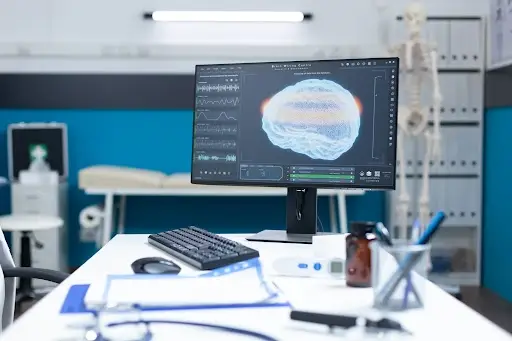Medical billing services are essential in today’s ever changing healthcare environment because they guarantee that healthcare practitioners are fairly compensated for the services they perform. However, what precisely are medical billing services, and how are they changing in tandem with technological advancements? Let’s investigate this crucial facet of healthcare management.
Traditional vs. Modern Medical Billing Services
In the past, medical billing was done manually by healthcare professionals using manual coding and paper-based documentation. But as technology has advanced, medical billing services have changed significantly in the current day. Healthcare practitioners now have access to electronic systems and cutting-edge software programs that expedite the billing process and improve accuracy and efficiency.
Technological Innovations in Medical Billing Services
The most vivid medical billing innovation is electronic health records (EHR) integration which is the most successful innovation. The information of the patients is electronically preserved and treated in an EHR system, which includes the medical history, diagnoses and the treatment plans. EHR setup can be easily comprised with billing features through which healthcare providers would be able to generate and submit claims electronically, which will result in saving time and reducing errors in paperwork.
Another critical innovation in the automation technology of current medical billing is automation. Automated billing processes enabled by the software solutions provide the available option to execute the procedures that usually are repetitive like claims filing, posting payments, and denials. Moreover, this decreases the timeframe of the billing cycle while also reducing the possibility of human mistakes, therefore improving the claims in the billing accuracy as well as quicker reimbursements.
Along with AI and machine learning technologies, the medical billing sphere is an area that is positively impacted by the change. Utilizing such tools, providers are able to study large sets of data to pinpoint what patterns are prevailing and therefore they can increase billing outflows by making the process more efficient. AI-driven tools in coding, billing compliance, and revenue forecasting will allow healthcare organizations to make sound decisions based on data that will, in the long run, boost financial performance.
The amazing thing with cloud. Based on medical billing platforms, it has redefined how medical billing services are operated currently. This technology enables healthcare professionals to use payment programs and computing devices by communicating over the Internet so the providers are relieved of expensive in-house infrastructures. Better quality features like scalability, flexibility, and enhanced collaborative Ness are among a number of benefits of cloud solutions that most modern healthcare organizations take advantage of regardless of their size.
Benefits of Technological Integration
The incorporation of technology into the medical billing area delivers options to both the health service providers and the patients. It is a big benefit because it helps in increasing efficiency and accuracy by replacing repetitive tasks with machines and lessening the number of mistakes made by people. The clinical information integration technology leads to speedy reimbursement of claims and timely flow of cash in the healthcare facilities which in turn, make healthcare practice more profitable.
Through providing decrease in burden of administrative activities, the use of technology-driven billing services allows physicians to spend more time with their patients. The billing process can be streamlined with the staff able to spend less time on paperwork and more time providing better quality services to patients; this will enhance care delivery and reduce the number of people suffering from severe conditions.
In addition, the participation of technology in the revenue cycle management process provides process owners with updated information on billing performance and revenue trends meticulously. Tracking all claims, pinpointing the bottlenecking points and implementing the best strategies to decrease revenue leakage and optimize the revenue collecting process.
Role of Healthcare Billing Services
Healthcare billing services are an integral part of the healthcare providers’ configuration of financial jobs as these services are related to the providers’ billing and revenue cycle management functions. Such super-services provide competence in coding of medical services, billing, entry of claims, payment posting and denial management among other fields of operation and this helps healthcare organizations to maximize on revenue and minimize compliance risks.
Outsourcing billing process to professionals may be useful for the medical practitioners since it will enable them to avail contemporary advances in the sector without committing the equal investment. Through healthcare billing services collaboration, caregivers can be sure of delivering good quality services to the patient as experts will take over the fee-collection and payments complexities.
The Role of Medical Billing Specialists
Medical Billing Specialists are educated professionals whose duties typically include generating, verifying, and submitting health insurance claims to private and government payers. The experts in this field have an intimate understanding of the medical coding guidelines and regulations, billing laws and insurance plans that make all submissions be done correctly and as much revenue can be received.
Efficient revenue cycle management through collaboration with the Medical Billing Specialists, health care providers and billing services is most important. Stakeholders can partner to ensure the complete and error-proof coding of claims, and the documentation is complete, and are redressed on a timely basis, which may yield successful financial performance of healthcare organizations.
Challenges and Considerations
Despite the fact that technology has afforded extensive development to medical billing operations, it creates both difficulties and additional elements for healthcare service providers. First off, the initial expenditures in the form of setting up infrastructures and financing training programs to operate advanced billing systems are burdensome and, therefore, require sound financial planning and investment.
Intervention with the current system and work flow can also be for challenging point as health systems need to make sure of compatibility and interoperability with many software systems available. Data privacy and security concerns, as well, are a vital thing to worry about for healthcare providers and they should ensure proper protection of the patient information as HIPAA requirements mandate.
Imposing regulation rules for using technology will allow companies to avoid all fines and problems from the legal point of view. Clinical officers should always be abreast of new regulations in the market and introduce risk management models to ensure privacy of medical information a responsibility of all the patients.

Your Trusted Partner in Streamlined Medical Billing Services
We at MedsRole are aware of the difficulties healthcare providers have in overseeing their revenue cycle and billing processes. For this reason, we’re dedicated to offering thorough and cutting-edge solutions that will optimize your medical billing procedures and boost sales. Our cutting-edge technological platforms, skilled medical billing professionals, and unwavering commitment to quality allow healthcare organizations to concentrate on what they do best—providing excellent patient care. MedsRole is here to help you every step of the way, whether your goal is to improve your current billing skills or outsource your billing chores. Join up with us right now to see how MedsRole can help you succeed in your profession and maximize your financial performance.








